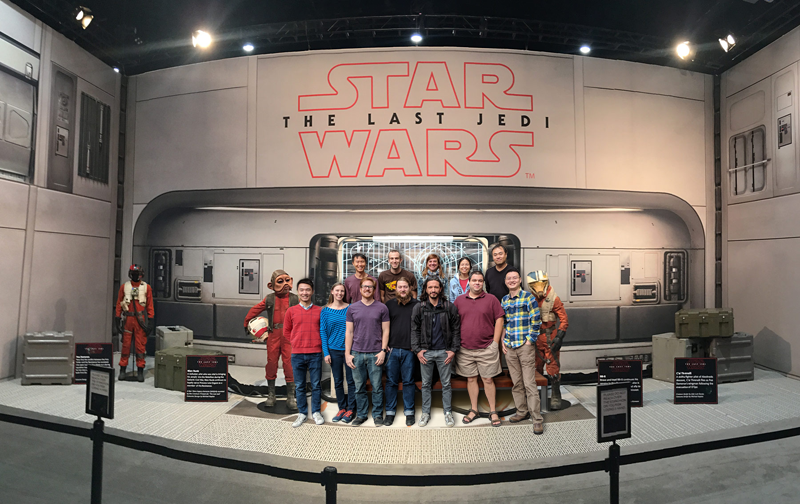Rather than summarize the 2017 progress on in each project in separate, project-specific posts, I’m putting it all in once post this year for one important reason–recruitment! As with any academic research group, we expect to see a number of our talented team members move on to bigger and better things. 2017 did not disappoint (well, it was disappointing to lose such talent, but we’re also happy that these awesome people are finding amazing new opportunities).
In saying farewell to 2017, we also bid farewell and best wishes to team members who have really pushed the boundaries of science during their time here including:
- Ramya Gamini–who takes her bioinformatics expertise to Pfizer where she will continue as a postdoctoral associate.
- Tim Putman–who takes his bioinformatics chops to Oregon Health & Science University (OHSU) as a Bioinformatics Software Developer. There, he will continue to push for open data and data reuse as he works on developing the Monarch web application, aggregate and structure microbial model organism data in The Monarch Initiative Infrastructure, and develop tools and aggregate data in support of the NCATS Translator Project.
- Benjamin Good–the talented Assistant Professor who drove the Gene Wiki / Wiki Data projects in the Su Lab as well as a number of citizen science projects such as Science Game Lab, theCure, Mark2Cure, and more!
- Max Nanis–research programmer, developer, artist. His twitter feed is like a tribute to chaos. His success anywhere is a certainty.
- Sebastian Burgstaller-Muehlbacher–his profile on the Su Lab site will forever remain a fictional heavy metal tribute to science–Rock on!!!
Losing so much talent in 2017, we’re fortunate enough to recruit some new R|D rock stars to the lab and are happy to welcome:
- Byung Ryul Jeon–a visiting scientist, accomplished doctor, and scholar interested in broadening his knowledge and honing his research skills
- Laura Hughes–data scientist and web developer with a knack for purposeful and deliberate data visualization. Laura came to us after applying her skills to make the world a better place at her previous job with USAID.
- Alejo Covian–a full stack python developer shrouded in mystery.

Team members like Associate Professor Chunlei Wu, not only provides friendly expertise, and helpful guidance to new recruits–he’s also a leader when it comes to holiday fashion.
Chunlei has been the driving force behind BioGPS, MyGene.info, MyVariant.info, BioThings.io, and more. As recently announced, he will be the TSRI site principle investigator for the National Center for Data to Health (CD2H).
The newly created center will be led by researchers from OHSU (Tim has moved on from the Su Lab, but he hasn’t escaped our reach!!!!), Northwestern University, University of Washington, Johns Hopkins University School of Medicine, and Sage Bionetworks, together with TSRI, Washington University in St. Louis, the University of Iowa and The Jackson Laboratory.
For his part, Chunlei and his team will do what they do best–building high-performance and scalable data access infrastructure and defining community best practice for data processing and software implementations.
As of 2017, BioGPS has seen the launch of a new sheep atlas portal along with a corresponding research paper, and BioGPS made it to the top of the weekly list on Labworm. After demonstrating that the MyGene.info framework could be retooled for for Variants (MyVariant.info), the framework has been abstracted into the BioThings SDK. 2017 was a busy year for these related projects:
- Kevin presented about MyVariant.info at Heart BD2K site visit (2017.04.20)
- Chunlei presented to Global Alliance for Genomics and Health (GA4GH), Variant Interpretation for Cancer Consortium (VICC) working group (2017.05.09)
- Chunlei presented a poster on the BioThings SDK at ISMB/BOSC (2017.07.21 – 2017.07.25)
- Kevin presented a poster on the BioThings Explorer at ISMB/BOSC
- And the BioThings Explorer manuscript titled, “Cross-linking BioThings APIs through JSON-LD to facilitate knowledge exploration”, has been submitted
2017 has also been busy for the Gene Wiki / Wiki Data team here in the Su Lab as:
- the Gene Wiki / Wiki Data Team shared their work at Biocuration 2017 conference (03.26.2017 – 03.29.2017). Both Sebastian & Tim gave talks, while Greg and Nuria had poster presentations.
- Greg also presented at Heart BD2K site visit (2017.04.20)
- Andrew presented at Bioinformatics Open Source Conference (2017.07.22 – 2017.07.23)
- and Andrew was also featured on the Wikimedia Research Showcase Webcast (2017.08.23)
In case you missed it, the renewal grant application for this project was also shared in a blog post this year which gives the big picture idea of the project moving forward.
While we’re on the subject of crowdsourced science, Mark2Cure had a busy year as well.
- Mark2Cure hosteds #Mark4Rare event for Rare Disease Day (during the week prior to rare disease day)
- Mark2Cure organized/hosted the Citizen Science Expo at La Jolla Library (2017.03.11)
- Ginger presented about Mark2Cure at Heart BD2K site visit (2017.04.20)
- Mark2Cure was featured on SciStarter (2017.04.27)
- Mark2Cure had a joint webinar with Cochrane Crowd (2017.05.08) followed by a joint event (#MedLitBlitz) which included a Mark2Curathon (2017.05.11)
- Ginger presented Mark2Cure at the 2017 Citizen Science Association Conference during the citizen science for biomedical research panel (2015.05.18)
- Ginger presented a poster on Mark2Cure at the CSA 2017 conference (2015.05.18)
- Max delivered a Project Slam about Mark2Cure at the CSA 2017 conference (2015.05.18)
- Mark2Cure joined the CitSciBio at table in St. Paul Science Museum for Citizen Science Festival (2015.05.20)
- Mark2Cure paneled for #CitSciChat (2017.07.19)
- Mark2Cure joined #Dazzle4rare 2017.08.13 – 2017.08.19
In addition to these projects, members of the Su Lab have been busy advancing research in protein folding/microscopy analysis methods, osteoarthritis, and data-driven drug re-purposing methodologies–all while managing to have an epic time.

